No matter how far we roam, Africa will always hold a special place in our hearts. Africa is a place that will change you. It will change the way you see the world and how you look at life. It will inspire you and yet leave your head spinning. After a trip to Africa, you will never be the same, and that’s even truer if you go on an overland Safari.
1. You’ll Need To Adjust Your Adventure Scale
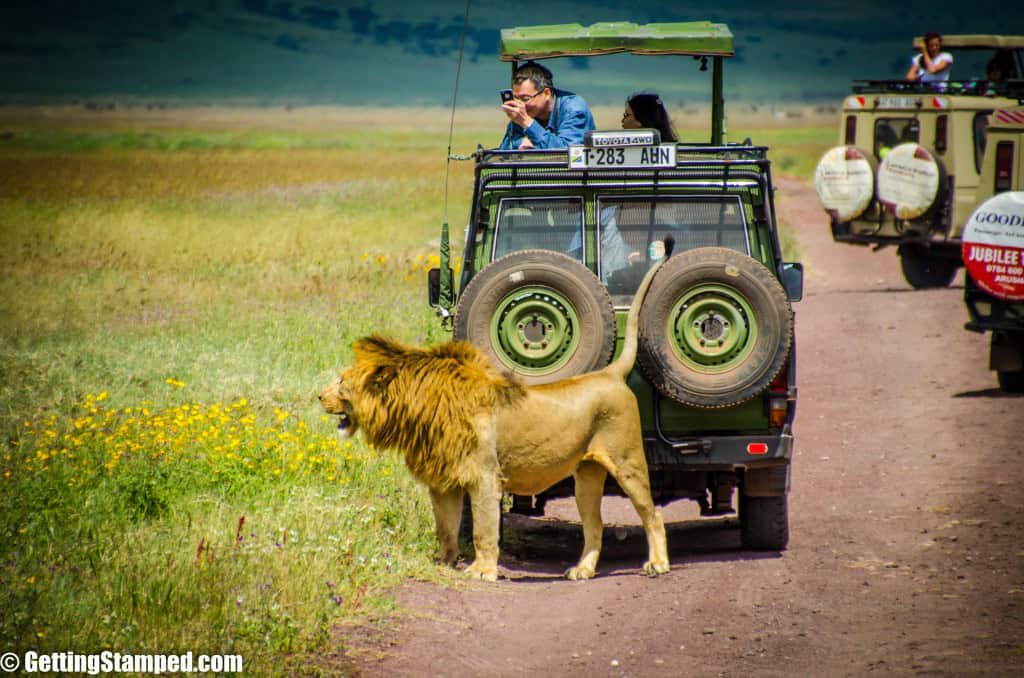
Safari and adventure go hand in hand, but you have no idea how much of an adventure Africa is until you go. You may need to take out an annual travel insurance policy for all the amazing adventures Africa has to offer.
Don’t forget your insurance! You never know when you’ll need it. We suggest getting travel insurance with Safety Wing. Which coverage includes medical, trip interruption, lost luggage, and more. Often rates are as low as $12 a week.
2. You Will Never Be Able To Go To The Zoo Again
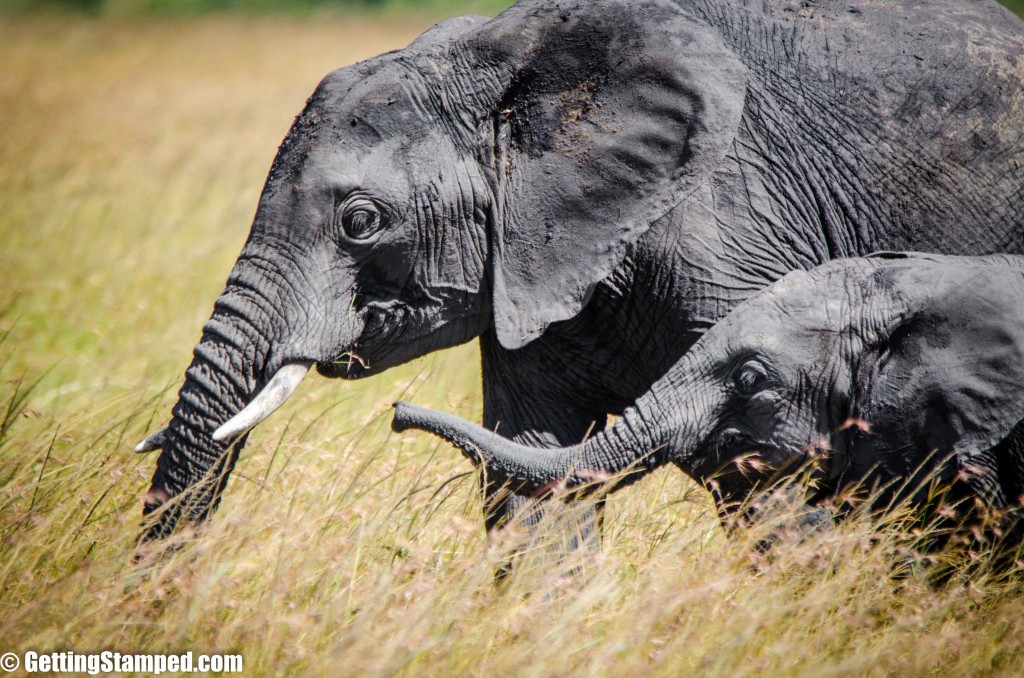
Once you see wild lions stalking a herd of buffalo, elephant crossing in front of your jeep, or a leopard lying on the branch of a tree, you will never be the same. A trip to the zoo will never compare.
3. The Stars In Africa
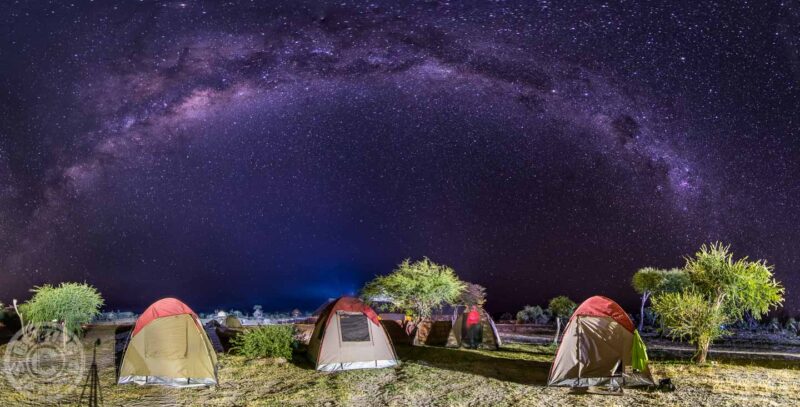
There is something magical about the stars in Africa. You’re hundreds of miles from civilization on an Africa Safari and the stars shine so brightly. We’ve had some amazing nights sleeping under the stars in Namibia. In the crisp desert air, you can see almost every star in the sky. Seeing the stars from Africa will change you, not many places in the world can compare.
4. That Moment When You Realize Pride Rock Is Real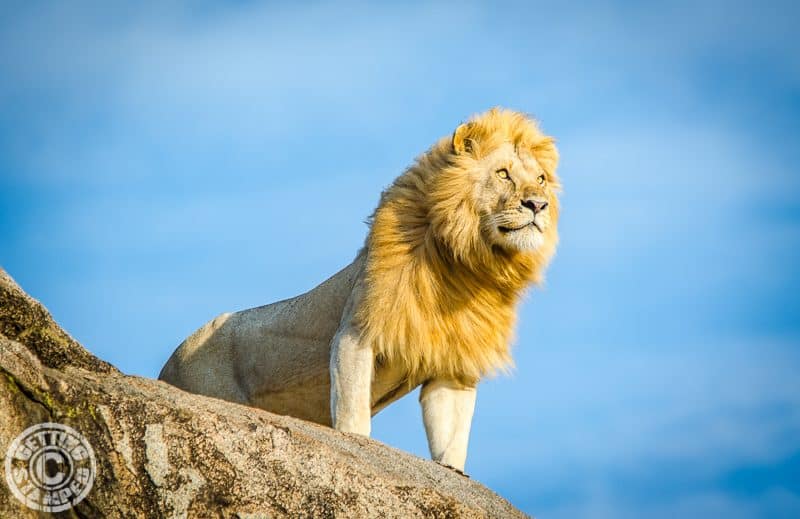
A trip to Africa reinstalls the hope that magical things still do exist in the world. Driving through the Serengeti National Park you can see the real-life lion king with lions perched on massive ancient rocks just as they did in the Lion King Movie.
5. The Dark Colonial History
A trip to Africa also shows you the other side of things. The side that most people would rather forget about rather than address. You see the way colonialism changed Africa, some countries worse than others. You still see how it affects the people of today. You’ll realize you don’t know anything about Africa, or at least the real story.
6. The Friends Along The Way
There is something intensely bonding about sitting around a campfire in the middle of Africa. Friends that you make on an overland safari may live on opposite ends of the world, but you’ll stay connected because the friendships you build while on safari are something special. We’ve met up with safari mates on two different continents so far.
7. Africa Is Not As Poor As You Thought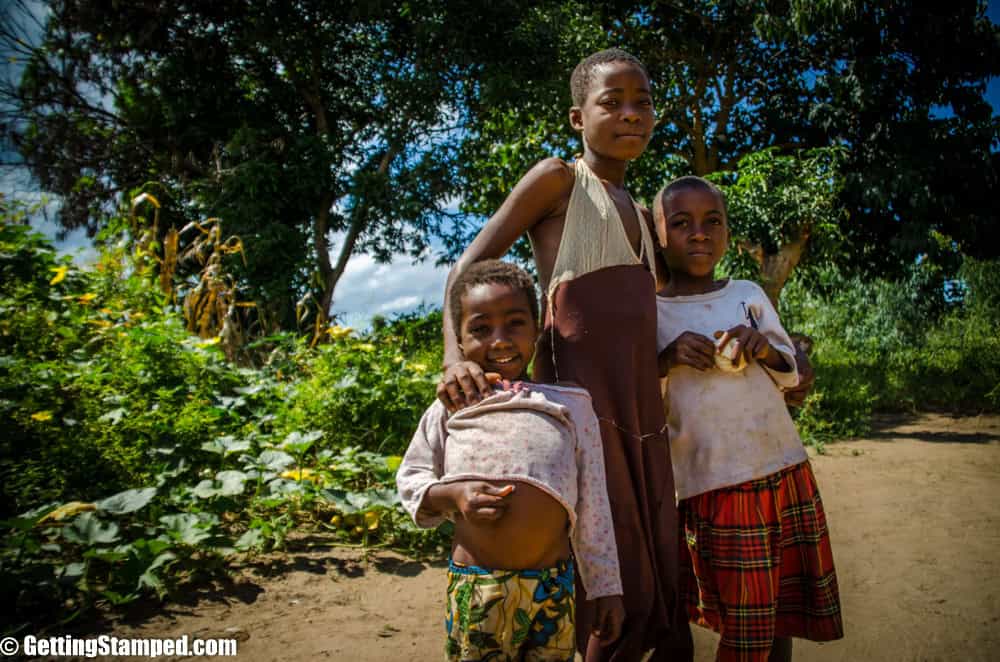
The continent of Africa is not one giant aid campaign. There are big cities with skyscrapers, and there are also small villages with cultural riches. There are plenty of places where people live with very little, but instead of pitting them we should probably try to be more like them. The people here seem to be happier than a lot of developed countries. There is something to be learned from the people of Africa. While things are far from perfect you’ll definitely leave with a different perspective.
Girls Guide to Overland Safaris
An African safari is a trip of a lifetime and one that will not disappoint. It was the #1 thing I was looking forward to on our trip. However, a month before we were set to fly to Africa I started freaking out…what were the bathrooms like, what was I going to eat, can I survive camping that long, what should I pack, can I bring my hair dryer?
These are just a few of the questions I had before we headed to Africa for our 43 day overland safari from Nairobi to Cape Town. I searched the internet for answers, but nothing… so here you go girls! Here is my girl’s guide to an overland safari.
Camping on an Overland Safari
I was not a camper, I only really camped maybe 2 times in the last 15 years and each time for only 2 nights max and went to bed usually after a few too many alcoholic beverages. I was nervous about being in a tent for a month and a half!
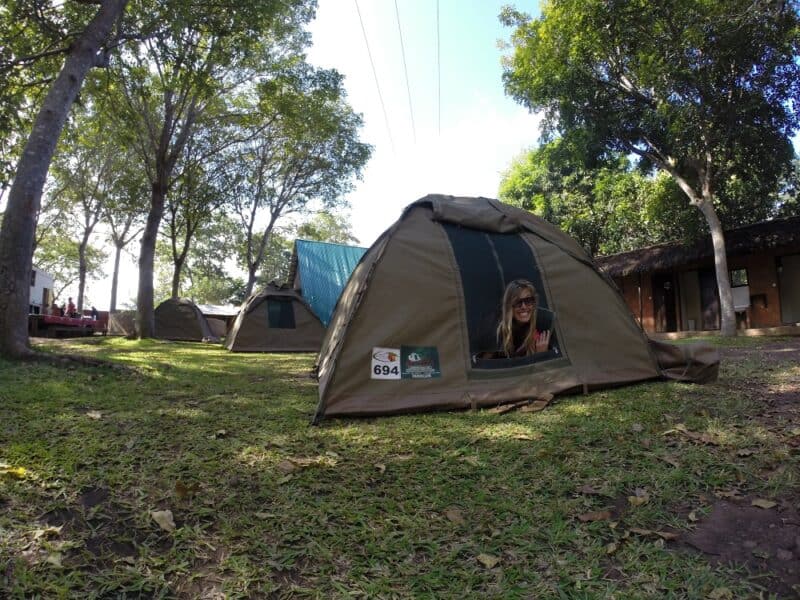
Your tent will keep out all the creepy crawly things, that is as long as you keep all zippers closed. We forgot one zipper once and ended up with a mouse in our tent….I slept in the truck that night I was too freaked out! It takes about 3 days to get your tent system setup all figure out, you will be sharing your tent with another person so you just have to work together to put it up. Once you are good at it, you’ll have your tent set up within 5 minutes, honestly it’s so easy. You will be assigned the same tent every day, so it’s up to you to keep it clean. We had to sweep ours out every few days.
Our overland safari company provided sleeping mats, which made for a pretty good night’s sleep. I expected to have terrible backaches, and restless nights but this was not the case. If I had any problems sleeping it was mainly because I purchased a sleeping bag that was too hot, it was made for much cooler temperatures. There was only 1 night where I swear there was something outside my tent. Adam and I both laid there scared shitless for hours trying to not to move. In Etosha National Park we heard the lions roaring at night, and that was the coolest thing ever (they were outside the fences).
What are the Bathrooms like on an Overland Safari?
Depending on where in Africa your overland safari is going this will vary vastly. Most overland safaris either start or end in Nairobi, Kenya or Cape Town, South Africa. If you start your overland safari in Kenya you will experience the worst first. Almost all campsites in Kenya, Tanzania, and Malawi had COLD water only showers and the occasional shower bug. As for bathrooms there were western toilets at campsites, but dirty squat toilets while driving usually. If you are on an overland safari from Nairobi to Cape Town things will start to improve around day 20 when you get closer to Victoria Falls, Zambia.
If you start in Cape Town and are making your way towards Nairobi you will be blessed with amazing facilities the first half of your trip. Throughout Namibia, Botswana, and Zambia most campsites will have HOT water, and dramatically cleaner & nicer facilities.
Also if you happen to be traveling during your time of the month, I would suggest bringing any products from home. It may be days before you go to a proper store that has what you might be looking for. Also our driver stopped around every 2 hours, but if you had to go to bathroom before a stop we just had to knock on the window and they would stop at the next possible place.
Campground Situation on an Overland Safari
Again this depends on where in Africa your overland safari is going this will vary vastly. Once again the if you are starting in Nairobi you start with the most rustic and things get better as you move south.
In Kenya, Tanzania, and Malawi all the campgrounds had a bathroom with western toilets, most had bars where beers were around $2-3, security men that would walk the premises at night, limited if any Wi-Fi, and all had gates/fences except when in the Serengeti National Park. We literally had this elephant walk through our camp.
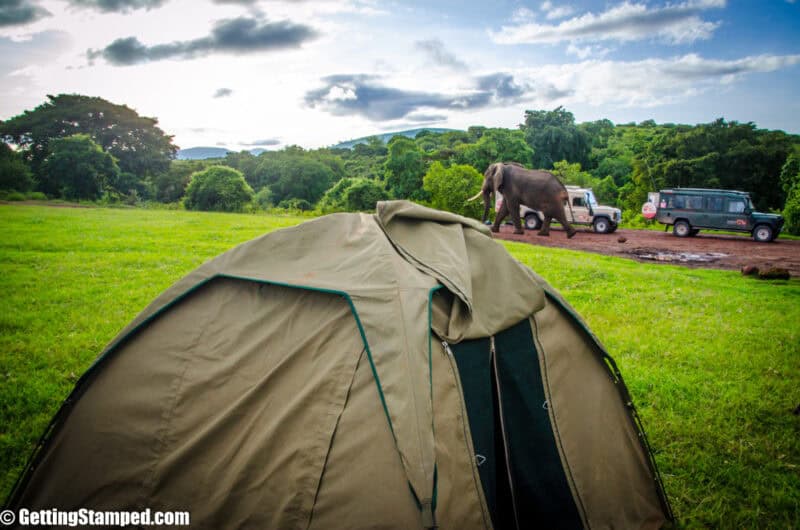
Once you get to Zambia most campground will have Wi-Fi, but be prepared to always pay for it. Depending on your safari company many places swimming pools, HOT showers, and cheaper beer at the bars & tasty wine.
Clothing Situation
What to pack for an African overland safari was something that stressed me out before my first trip. After my first overland trip, I learned a few things about what worked and didn’t. As you might have guessed, Africa is not a fashion show. Pack things that are comfortable and practical. I lived in my “elephant pants” the backpacker pants you get all over Asia. Pack light but not too light. You will have time to do laundry about once a week, but remember that everyone else on the truck will also be doing it. This often was a hassle, all fighting for the wash bin and space on the clothesline. Bring a clothesline & clothespins from home. Below is a packing list assuming you are going from Kenya to South Africa in May-June and doing laundry every 10 days.
Suggested Women’s packing list for an Overland Safari
- 2 pairs of pants -1 jean and 1 good for outdoor activities
- 2 pairs of lounge pants- yoga pants or elephants work great
- 2 long sleeve shirts
- 1-2 dresses- If spending nights in Zanzibar, Victoria Falls, Cape Town nice to dress up a little
- 7- T-shirts- Make sure to bring shirts that dry quick and go with everything
- 1-2 Bikinis – You will have a few days on the beach, and campground pools bikinis double as bra & underwear if you find yourself out
- 10 pairs of underwear- Even though you do laundry often bring more they are small
- 5 pairs of socks- Wear them two days in a row to save on laundry
- Zip-up hoodie
- Fleece jacket- Only if traveling over winter months
- Rain jacket
- 1-2 pairs sandals- You will need sandals for all the showers
- Tennis shoes
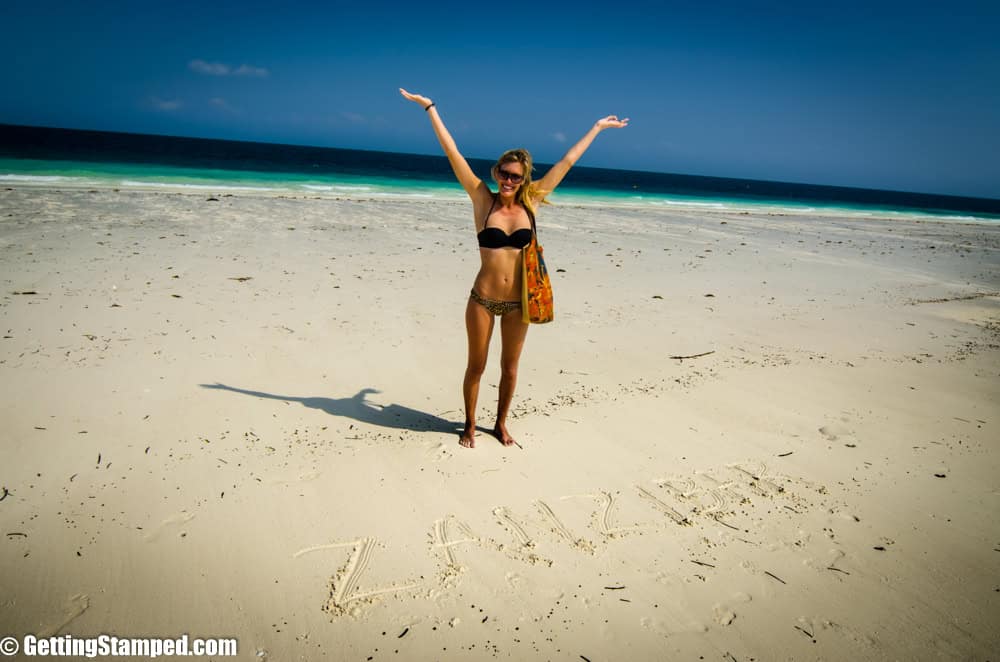
My must-have clothing items are: prAna yoga leggings, a comfortable big sweatshirt, elephant pants, and a bikini (I’m a beach lover).
Food Situation on an Overland Safari
Will I starve? Will I gain or lose weight on an overland safari? I was really nervous going into Africa about the food, I admit, I am a very picky eater. Once again if you start your overland safari in Kenya you will experience the worst first, the food isn’t terrible and I can promise it will get better.
Once you visit some of the local grocery stores you will realize the slim pickings your tour leader has. The food we cooked was always good for dinners we had chicken, rice, potatoes, beef, spaghetti, garlic bread, etc. The breakfast was cereal, yogurt, toast, coffee, and fruit. Lunch was typically packed sandwiches we would make in the morning or leftovers, every so often if we were passing through a town we would get “lunch money” and we could go out for lunch on our own. When you head into Serengeti & Mara the food is brought in by another company, and not as good or filling.
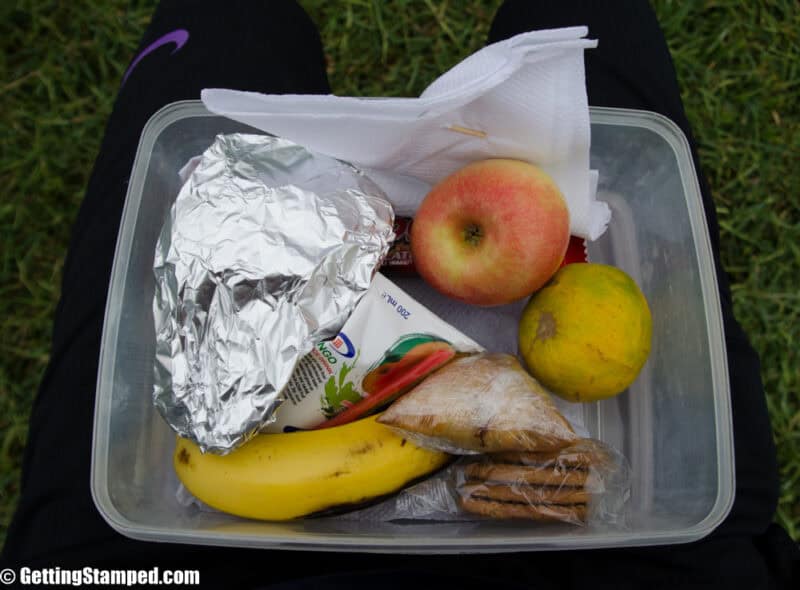
You will not starve that is for sure, but if you are picky bring a few of your favorite items from home. For me, I brought 2 jars of JIF peanut butter. You will stop every day at shops where you can get kit-kats, snickers, cookies, chips, soda, etc. You won’t have the option of much fresh fruit. Also realize you have little to no activity, so if you are watching your weight take this into consideration.
Just Go! Africa is AMAZING
Hopefully, my girls guide to an overland safari has helped answer any questions you have. Oh and if you’re wondering about that hairdryer, yes I brought it and I used it maybe 6 times out of 43 days…it’s totally up to you if you have room in your bag. If you have any questions just leave them below in the comments or send me an email.
Pre-Safari Accommodation Options
If your safari ends or starts in Cape Town we highly recommend the Primi Royal Hotel in Camps Bay, we spent 10 nights here at the end of our 43-day tour last. Price was right for only $55 a night, check prices on Agoda here. Great place to recover from an overland safari, they had super comfortable beds, ocean views, swimming pool, free Wi-Fi, the best free breakfast in ages, and we found an amazing steak restaurant down the street Hussar’s Grill that lets you BYO bottle of wine! I would spend 3-4 nights in Camps Bay and if you have time make your way to Stellenbosch for another 3-4 nights in a lodge or estate so gorgeous accommodation options. This year we hope to spend 3-4 nights in Stellenbosch, as last time we just did a day trip from Cape Town.
If your safari starts or ends in Nairobi I would spend minimal time here, we spent 4 nights in Nairobi. The city felt unsafe overall, with nothing to do. This year we have 2 nights before our overland safari departs. Your safari will suggest a hotel, which is where the pre-departure meeting will likely happen. Acacia-Africa has their meeting at Boulevard Hotel, rates & bookings can be here. Your safari company can book this for you, but you might want to see if you can book it yourself for a reduced
Best Camera for an Overland Safari
As you plan your African Overland Safari you might be looking at some new camera gear or a new camera. A safari in Africa is a trip of a lifetime and you’ll want to capture it.
Contents:
- Best Camera for a safari under $250
- Best Camera for a safari for under $500
- Best Camera for a safari under $1000
- Best Camera setup for a safari for $2,000
- Photography Experience for a Safari
- Additional Tips for picking a camera to bring on an Africa Safari
I have been asked a bunch of times “What camera should I buy or bring on an African Overland Safari?”
Well…That’s a loaded question, and to answer that properly I would ask you two questions: What kind of photography experience do you have? And secondly, what’s your budget?
Let’s start with the second question because it’s less subjective. When it comes to wildlife and safari photography the sky is the limit and you can spend more than $10,000+ on a single lens. However, unless you just landed a National Geographic contract or just have that kind of money to spend on gear you will probably be looking for a camera that fits your budget. I have put together a rough idea of what I would buy if I had a set amount money to spend on camera gear.
Best Budget Camera for an overland safari
Under $250 – Technology is improving at a breakneck pace in this market and there are lots of great cameras available for a minimal investment. A few things to look for:
- Large optical zoom
- Optical stabilization
- High speed or burst photo capabilities
- Quality brand with high ratings
Best camera under $250 for an African Safari
- Panasonic LUMIX DMC-FZ70 16.1 MP Digital Camera with 60x Optical Image Stabilized. Cost: $248
This camera ticks all the boxes with a huge optical zoom, stabilization, great video options, and a quality brand with excellent reviews. This is an incredible deal and for the money this looks to be a perfect camera for an African Safari.
Best Mid-Range Camera for an overland safari
$250-$500
In this price bracket, you will be looking at the compact mirror-less cameras. Look for similar characteristics in these cameras as the group above. The cameras at this price point will have better and larger sensors along will a number of general improvements.
Best camera under $500 for an African Safari
- Canon PowerShot SX60 HS Digital Camera – 65x zoom with Optical stabilization, 6.5 shots per second, high-quality sensor, good reviews and top camera brand. Cost:$499
Best Camera for an overland safari under $1,000
$500-$1000
Once you are above the $500 mark you will mostly be looking at DSLR cameras. This is where it gets tricky and the options are almost limitless. If I had $1000 to spend on camera gear I would buy a medium end DSLR camera body and an all-in-one lens. Most times you will see DSLRs at the camera shops sold as a kit with a single lens or maybe two. These lens are fine but nothing special and not usually the range you will want for a safari. If you buy at a camera shop or online you can buy just the camera body and then buy the lens you really want separate.
DSLR bodies for an African Safari under $1,000
- Nikon D5300 is a very capable body and is somewhere between the entry level and mid-range. The D5300 has a very god sensor with advanced technology at an affordable price of $696.
Lenses for an African Safari
Personally I would buy a quality all-in-one lens from either Tamron or Sigma. For the money they have some of the best value lenses. I currently use the Tamron 18-270 and took it on Safari last year and got some great pictures.
- Tamron 18-270 F3.5-6.3 – Cost: $449
- Sigma 18-250 F3.5-6.3 – Cost: $349
- Tamron 18-200 F3.5-6.3 – Cost: $199
Best Mid to High-end Camera for an Overland safari under $2,000
The increased budget gives you a bunch of different options to consider. If I were to go out and buy a new set of gear for $2000 I would again buy the camera body and lens separately. I would invest a bit more into the body and lens selection. With $2,000 I would split the money between the body and lens.
Camera Body: Nikon D7100 is a solid mid-range camera that will last you many years and take some great photos. Cost $997
Lens Option 1 – I would choose the versatile new all-in-one lens from Nikon 18-300. The lens will be great for Africa and for all types of travel photos. If you have a few spare dollars consider buying a teleconverter for the lens which will double your zoom to 600mm. Our you can buy the package with the Nikon 18-300 lens and the teleconverter for $1079 on Amazon here.
Lens Option 2 – The Sigma 150-500mm lens is an awesome lens for an African Safari for $799 it will get you very close to the wildlife. However, if you go this route you will need a shorter lens for the rest of your travel photography something like the standard Nikon 18-55 or similar.
Over $2,000 – There are many options and usually people spending that kind of money will already have some gear that they will be using in combination with the new gear. So it gets too cloudy to make specific recommendations. However, some general recommendations would be to buy gear that is going to last, consider renting before buying, and make sure the gear will be compatible with future purchases.
Question #2: What’s your Photography Experience?
I ask what’s your photography experience because a person new to photography with a top-of-the-line camera with a huge wildlife lens probably is going to take worse photos that they would with a simpler, more intuitive camera. Spending a bunch on money on a camera won’t guarantee great photos. If you have been using a point and shoot or a compact mirror-less camera and you are thinking about making the jump to a bigger DSLR an African Safari is the perfect excuse, but if you buy one make sure to practice with it before you get to Africa.
Additional Tips for Selecting Camera Gear for an African Safari
- Don’t rely on a GoPro for your main camera on an African Safari. The GoPro is a great camera for action sport and can be a great camera to bring to Africa, but it won’t perform the best for wildlife photos. The GoPro is a very wide angle camera to capture actions shots, but that makes everything very far away and small in pictures. You need to be very close to thing to get good pictures with a GoPro, and I don’t know about you but I don’t want to get that close to a lion or other African Wildlife.
- Upgrade your apps – If you plan to use your iPhone or other built-in cameras consider buying some upgraded apps to control your camera. The basic programs built-in to devices have only limited control. Spending a few dollars on apps could make a big difference in the pictures you take away from your African Safari. When shopping for apps look for getting RAW file access, high shutter speeds, and manual control over aperture, shutter speed, and ISO.
- Hack your camera – If your budget is tight and you are trying to make the most out of your current camera you can add access to custom and manual controls to point and shoot cameras using software downloads like Magic Hat for Canon. This is especally fun if you ant to try to take some star photos at night in Africa.
Life on an Overland Safari
Most days overlanding Africa start early to pack up camp and make breakfast so we can get on the road and on to our next destination.
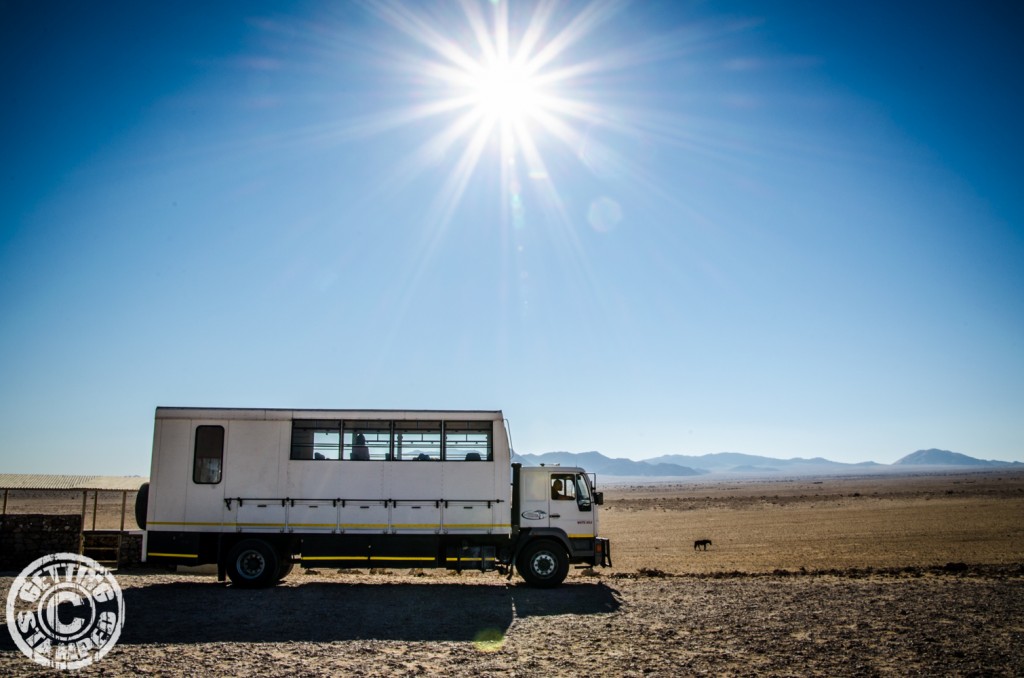
First things first the tent comes down and get packed under the truck. The tents go down easier than they go up, and even that part isn’t too bad. Once your tent and poles are packed away it’s time for breakfast.
Most days, breakfast is continental with cereals, toast, jams, muesli, and the standard fixings. On days where we had shorter drives, we have time to make a cooked breakfast with eggs, sausages, and beans.
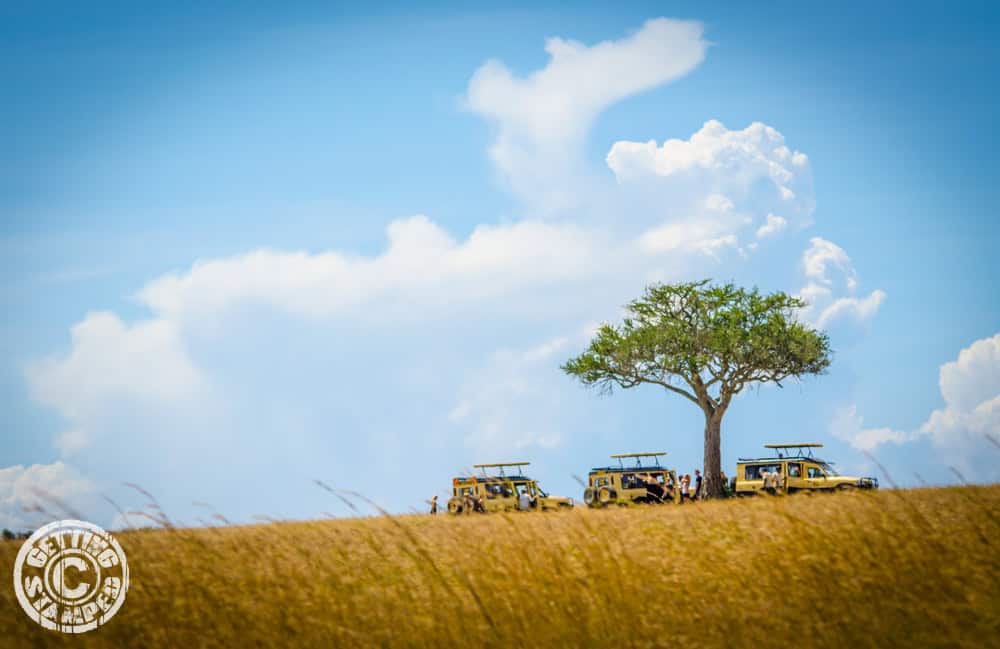
After breakfast, it’s time to jump on the truck and get on the road. Most days on the overland safari involve a fair amount of driving where you are on the road from early morning until the mid to late afternoon. We see lots of highlights on an overland safari and things in Africa can be very spread out and roads can be bad. The drive time is a good place to talk with fellow safari mates, read a book, go through pictures, or Hannah’s favorite activity, sleep.
On long drive days, we make lunch on the side of the road or in the truck while we are driving. Lunches on the truck are simple, but tasty usually sandwiches with fresh veggies and meat or pasta salads. Everyone helps to get the food ready and clean up. Every few days we have a chance to stop at a shop or supermarket to buy water and snacks for the between-meal munchies that are almost unavoidable while in the truck.
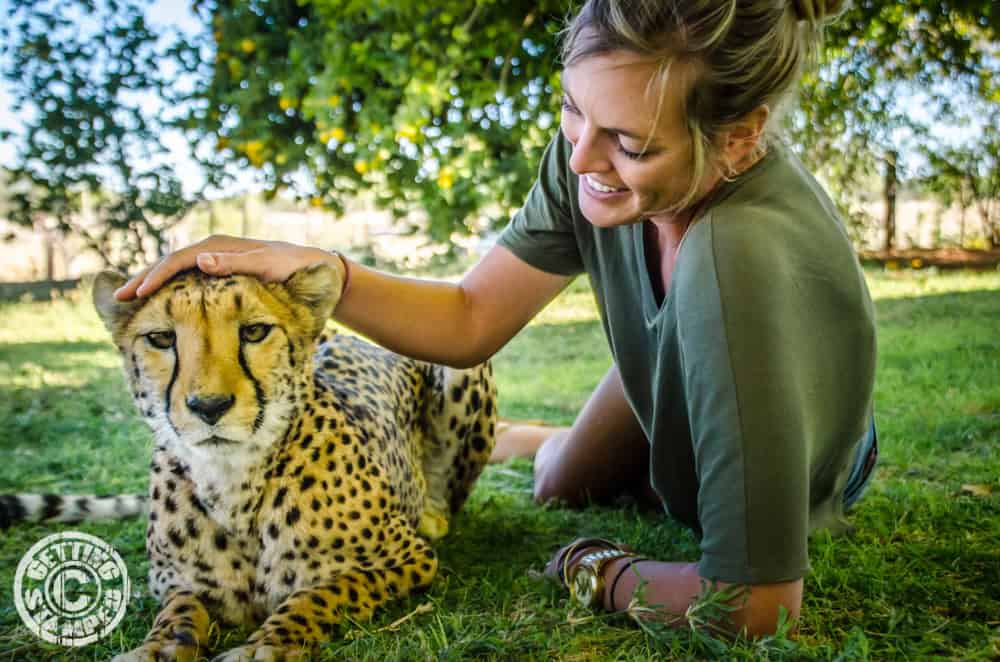
When we arrive at camp we either have one of our many activities or we are getting ready for one in the morning. An overland safari is jam-packed with things to keep us busy like trekking with mountain gorillas in Uganda, watching lions in the Serengeti, petting rescued cheetahs in Namibia, diving in Zanzibar, sleeping under the stars, poling through the delta in Botswana, wine tasting in South Africa, and so much more. To see what other highlights there are on a safari check out our Overland Africa page for all the stories.
Back at camp, it’s time to set up camp for the night. Tents go up quickly once you have the hang of it, and after a 43-day safari and a 58-day Ultimate Overland Safari, we are pretty much experts. Inside the tent, we have sleeping mat provided and our own sleeping bags and pillows. Camping on an overland safari is more comfortable than you think as long as you pack right. See our what to pack for an overland safari packing list.
After the tents are up its time to help with truck duties. Overland safaris are participation based, meaning every night we have duties to help our tour leaders with dinner, dishes, and clean up. Duties are pretty easy and rotate every day. One day we might be chopping vegetables, the next night we might be sweeping the truck or washing dishes.
Dinner on safari is the big meal of the day and is pretty tasty for being prepared around a campsite in the middle of Africa. Dinner is cooked on either a camp stove with some seasoned camp pans that kept under the truck or in cast iron pots called porkies over hot coals. They are much bigger than what is in your kitchen, and the might not have the Tefal reviews like the ones at home, but they make a pretty good camp meal. There is usually a main of beef, pork, or chicken with a side of rice, pasta, or potatoes. On cold nights, we sometimes have a pumpkin or vegetable soup. Everything is seasoned nicely and the meal is a time to come together as a group and eat and talk.
After dinner, it’s time for a campfire. Everyone gathers for a few beers or some wine and talks over the fire. On any given safari you have people from around the world who are generally like-minded and always good to talk to. Most nights aren’t too late because there is so much to do and see. However, whenever there is a break in the action or a day to sleep in the fire burns longer and everybody has a few extra beers. Most campsites have a fun bar and a place to hang out for those who want to stay up after the fire goes out.
The next morning it starts all over again with another African adventure to be had.
What to expect on an Overland Safari
An overland safari through Africa is an incredible experience and one of the few affordable ways to travel Africa. For us, and I am sure many other people, we didn’t know what to expect on an overland safari.
So we put this guide together to give some insight of what life is like on an overland safari through Africa. We spent 43-days traveling from Nairobi to Cape Town with Acacia Africa and then returned the following year for 58-days Nairobi to Cape Town again but trekking to the mountain gorillas in Uganda.
Along the way, we ran into different trucks from other companies and learned most safaris run in a similar fashion. While there maybe a few specifics that vary between companies, overall this is what to expect on an overland safari. This is the stuff we wished we would have known before going on an African safari.
The Truck
Life on an overland safari revolves around the truck. The truck gets you and all of you stuff from place to place and campsite to campsite. The trucks themselves are a unique setup, designed for everything you will encounter on an overland safari. Most are built on a large straight truck platform, with a cab for the driver and tour leader. The back is custom built to haul 18-24 people in relative comfort. All companies are not built the same and should be considered when selecting an overland company.
The more budget carriers have vinyl flexible sides instead of steel and windows as in the nicer trucks. We saw many different style of trucks along our 43-day trip from Nairobi to Cape Town. Some had front-facing seats, while others had benches along the sides that face inwards. Comfort is important when it comes to the inside of the truck because you will spend a good amount of time in the truck.
You will be in the big overland trucks when driving between the different attractions on your safari. There are some days where the entire day will be spent driving. On average plan on several hours per day depending on your route, which was much more than we expected.
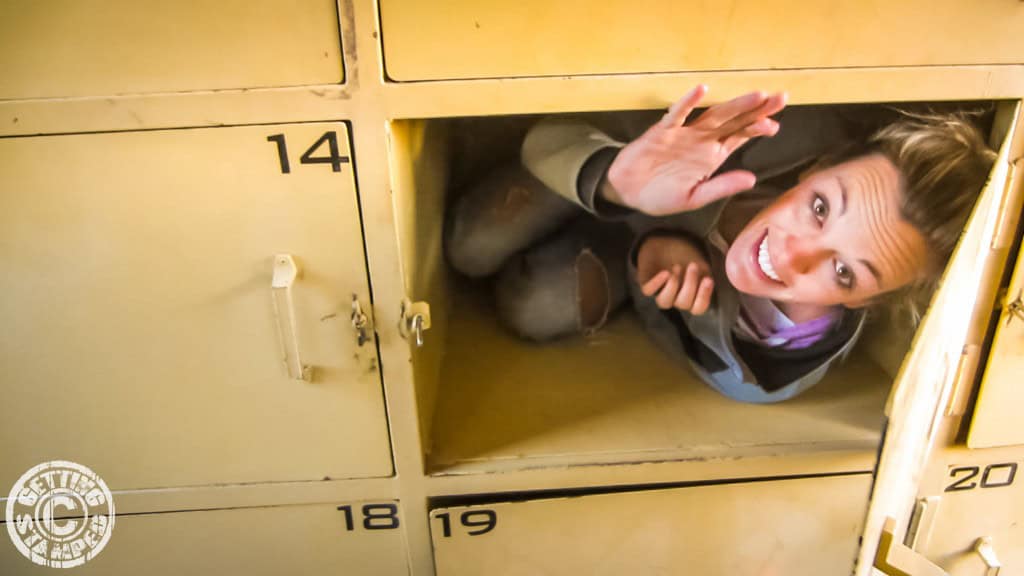
The trucks also hold all of your personal gear, and the equipment used at camp. Each passenger is given a locker usually at the back of the truck to store their bags and everything they brought. The lockers range in size truck by truck even within the same companies. Its best to check the company’s website to see their dimension before packing your bag.
I would not recommend bringing traditional luggage, soft duffels or backpacks will work much better. Most lockers are locked by a personal lock that you bring. When bringing a lock keep in mind a few things: the lock should have a narrow u-shaped bar because the holes on the latch are generally small. Its best to use a combination lock so you aren’t always looking for your key, how ever the constant bouncing seems to break these locks occasionally so bring an extra or two. We had a lock break as well as two other passengers. For more details on personal gear and what to pack checkout our recommended safari packing list.
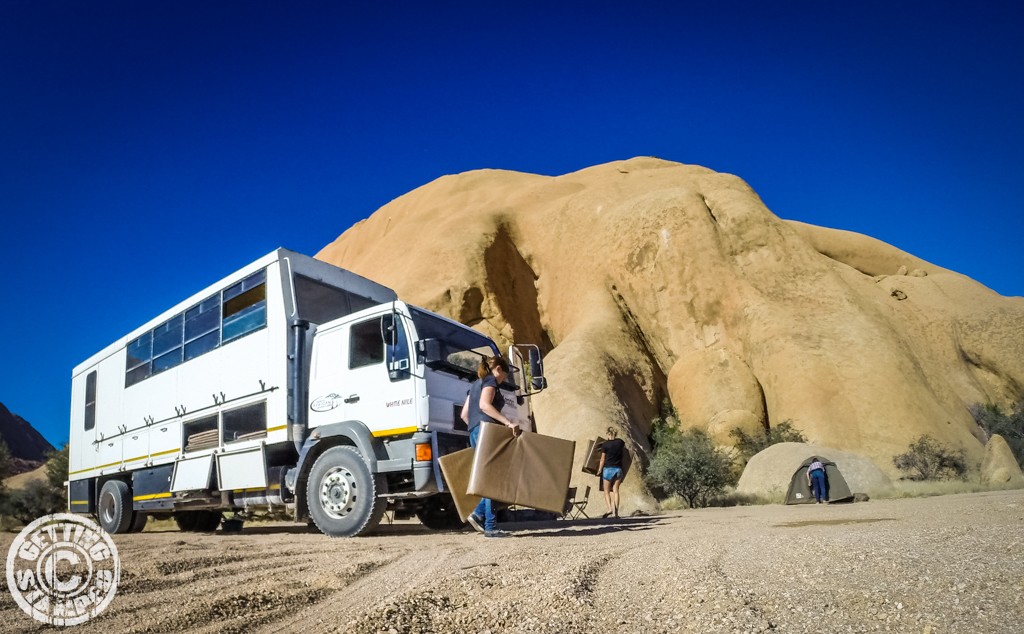
The truck also holds everything your guides will need to cook and for general camp stuff. On overland safaris, you will also need to help out with general cooking and camp duties. With large groups, the guides often setup a duty roster with chores that rotate for each passenger. Duties can be unloading and setup of cooking gear, cooking (with tour leader in charge), cleaning dishes, clean up of the truck, etc. Everyone is expected to pitch-in according to the needs of the driver and guide. For the most part, the jobs are easy and it helps keep the costs down not needing to have another crew member.
Food
As for the food you will be preparing and eating, that will depend widely on what part of Africa you are in. How it works is the tour leader will stop along the way to buy food and store it in the truck. The trucks generally have one large freezer for the main meals, and then some coolers for personal drinks and snacks. In larger cities like Nairobi, Lusaka, and others your guides will have access to a good amount of food options. However, in between, there are not nearly the options and the food choices are greatly reduced. On our trip, this was the worst in East Africa, Kenya, Tanzania, and Malawi. The further south you are the better and more western options you will have. It started to get better somewhat in Zambia and Botswana, but once in Namibia and South Africa the grocery stores are almost like at home.
The meals prepared outside of camp are also something to note. On days where you travel into the national parks are generally contracted out to smaller safari companies. The smaller companies drive you, prepare meals, and guide you through the national parks. The Maasai Mara, the Serengeti, the Okavango delta, and others are operated in this fashion. The meals provided here I found to be not as good as what is cooked at camp. In particular, the boxed lunches on game drives are lacking. At different points along the safari, your tour will stop in a few cities for longer periods, on those days meals are not always included. Check your itinerary for details for your tour. On our tour, all breakfasts were included, but several lunches and dinners were on our own. For us, this was Zanzibar, Victoria Falls, Windhoek, and Swakopmund.
Sleeping
There are few companies offering accommodated overland safaris, but for the most part, it’s a camping trip. Your home for the duration of the safari will be a two man durable canvas tent. We are not outdoor experts or avid campers and we did fine for our 43-day safari. It got to be easy setting up our tent daily, we got used to it and they are pretty easy tents.
Nearly every company we camped with had similar tents, same brand and everything. You should be provided with a sleeping mat (double check, this is a must to be comfortable), but the sleeping bag and pillow are on your own. Our tents were in good condition with no holes and tight zippers to keep bugs out. However, that doesn’t stop things from crawling in your tent when you forget to zip the zippers as we found out one night.
We found camping to be easier than expected, but I would highly recommend bring or buying a decent pillow if you are on a longer safari. Camping on travel pillows will make for a rough trip for anything more than a short safari. There are a few breaks from camping along the way (depending on your tour operator). We got real beds in Zanzibar and Swakopmund, and there were options to upgrade along the way if you needed a break. We upgraded a few times but found it not worth it for the most part.
The camp grounds vary quite a bit, and will greatly between companies. Most days we were in a formal, fenced camp ground with communal toilets and showers. There were many days without hot water or with what most would consider ‘hot’ water. I would say we averaged 75% hot showers, it was worst in East Africa with that number closer to 50%. The grounds are generally fenced with some sort of security, but this is company dependent. Some budget companies will do more ‘bush camping’ meaning without running water or hardly any facilities. On the nights before and after the national park visits will be spent inside or very near the parks, one night we slept with the elephants.
Costs
Africa is not as cheap as you may think. The most costly aspect of the trip we found were the activities. Everything that is not included, or is optional adds up quickly. No place more so than Victoria Falls area.
There are many amazing activities but at ridiculous prices. The cost of food I would say is on par with European prices, more expensive than in America, and slightly cheaper than in Australia. The bus rides are long and you are going to want some snacks for the ride. For the picky eaters (like Hannah) you can get Snickers, Kit Kat, Lays Chips, Coke, almost all brand names.
Cash
Most safaris require a local payment, and that money is supposed to be brought in US cash (usually unless specified different by your operator). US cash is the easiest to exchange in Africa and is probably the most useful foreign currency. However, outside of exchangers not many people will except it. Local currency was all most businesses wanted. In addition to the local payment extra US cash should be brought. Our company recommend to bring $15-20 per day per person, we ended up bringing around $2000 for both of us and we felt that was too much. We would have rather brought $1000 (for a 43-day trip) and taken out more local money from ATMs.
Are there ATMs on an overland trip in Africa? – YES
However, don’t count on them to take your card, or to even have money. Many will work just fine, we only encountered one that didn’t dispense funds to us, but just be prepared.
We had access to an ATM every few days and it was never a problem getting access to local money. I would still bring some US cash in case of problems with ATMS. Also, certain things were a better value in US, but for the most part you got terrible exchange rates when using US, or Euro, or Pound. Aussie dollar was not widely accepted or exchanged. Many Australians on our trip had trouble with the prepaid debit cards they brought from home. The Australian Post debit cards did not work at a majority of ATMs and caused issues for many people. Avoid bring cards of this type. Visa brand cards were the most accepted debit cards we found in Africa. It’s best to have a backup or second card in case of issues or your bank stops the card.
Area specific Details
East Africa:
You are going to eat a lot of Chapati, a local dense bread/pita served with just about every meal. The food is not going to be anything to write home about. The roads will be rough, and there will be a speed bump on the road every minute or at least it will seem like it. Overall conditions are rougher here than in the south in just about every aspect. However, this is where we had our best wildlife experiences.
Malawi:
This is the poorest country you will likely travel to on your safari. The people are very warm and friendly, but very poor. They also make some very intricate wood carvings, and you can barter with items in your pack for them. For whatever reason, the thing that everyone in Malawi wanted/needed were socks, if going through Malawi bring a pack of socks and you will be a the most popular person in Malawi. You can also dive in Lake Malawi (fresh water) with some exotic fresh water fish and a sunken VW army jeep. I dove on our last trip to Candy beach and it was an interesting dive for only $45 for one tank, $80 for two.
It’s going to be dusty, very dusty. No matter what time of the year. It doesn’t matter if all the windows and doors are shut while you are driving the dust will still get in. In winter it gets cold at night getting close to zero degrees C.
Now that you know what to expect on an African safari you have no reason not to go. If you are looking at taking a safari on your own, we cannot recommend Acacia Africa enough.
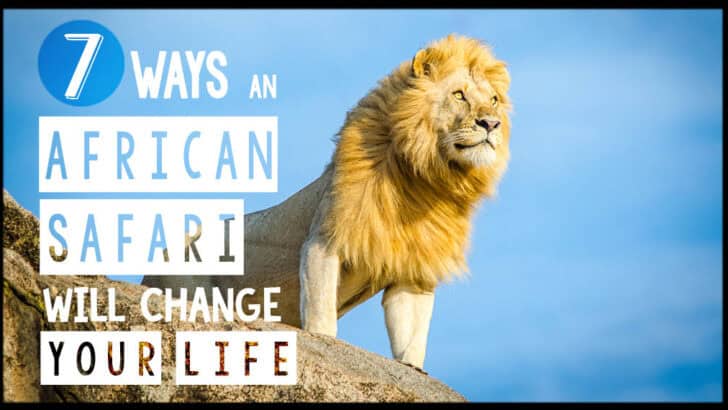
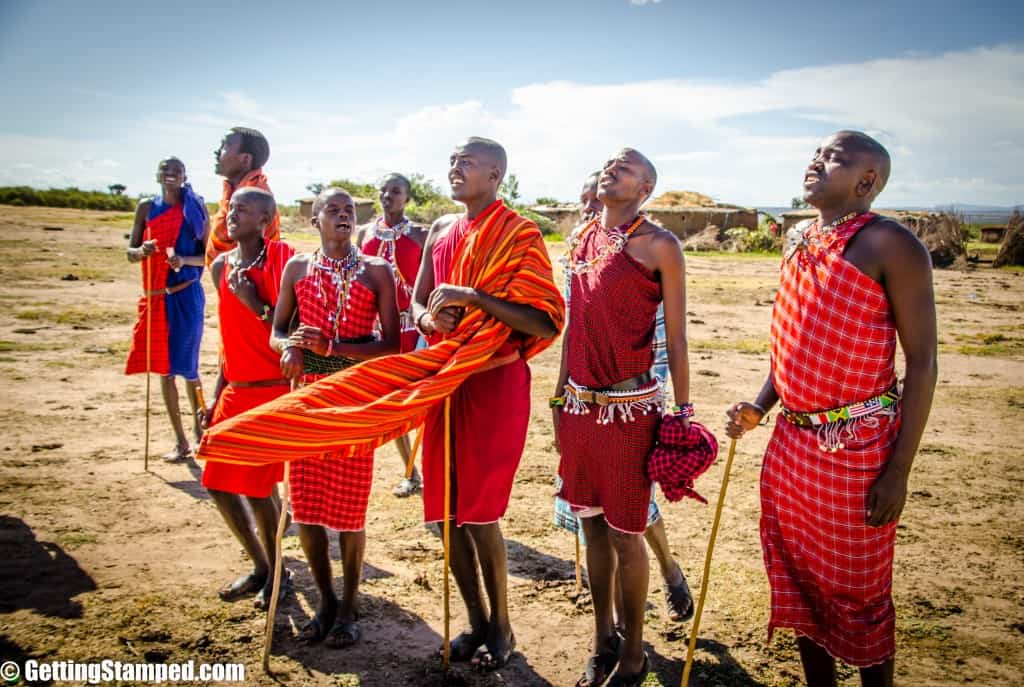
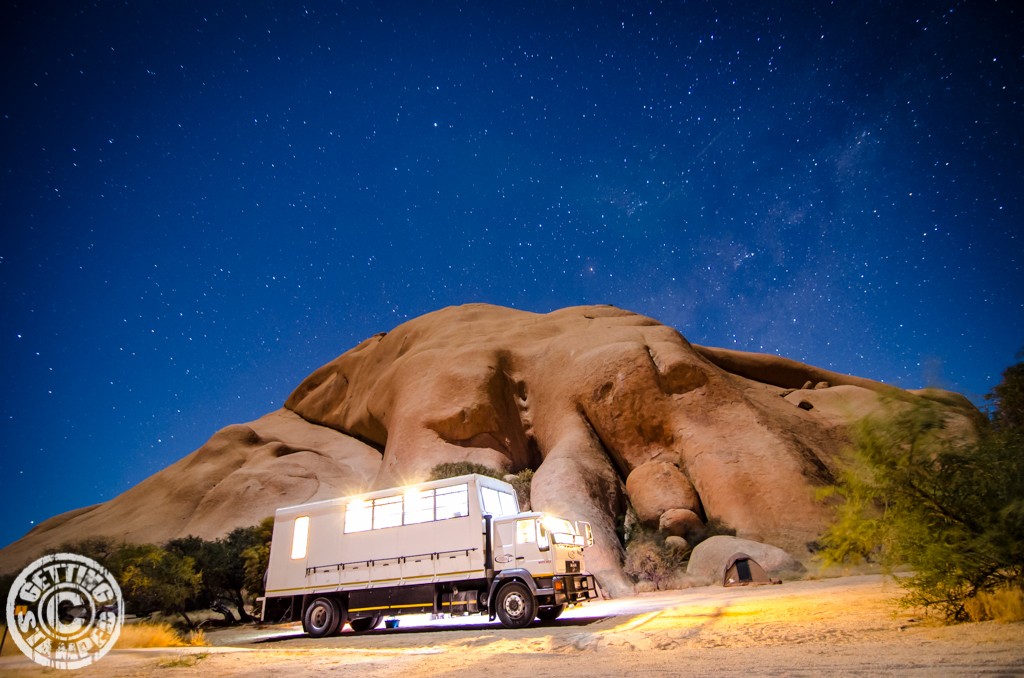
Julie Blenn
Tuesday 5th of November 2019
Inspiration to visit more of Africa ! I have been to South Africa and love it, so thank you for this alternative suggestion , and superb photos to draw me over for exploration .
Nathan George
Wednesday 15th of November 2017
Loved your post! Cool Photos!! This is first time I am visiting your website and I find this post very very useful thanks for giving such a great information.. Keep up the good work…I will love to visit your site again and again….
Hannah Lukaszewicz
Thursday 16th of November 2017
Glad you found us! We loved Africa, hence why we returned a year later for another African safari. Africa is amazing and we can't wait to return again. Come back for more travel content! Safe travels.
Kenya Travel Tips
Sunday 30th of October 2016
Wow beautiful pictures and the milky way is close enough too touch
Hannah
Monday 31st of October 2016
Thank you! Africa is an amazing continent, so much more to explore
Summer
Saturday 11th of June 2016
Thanks so much for sharing your insights and the travel company you recommend! Our family is taking an entire year to travel and one of our kids really, really, really wants to go to Africa. If I show him your pictures I think he will book the trip himself. ;)
Hannah
Saturday 16th of July 2016
Acacia def is the best company to go with on an overland African safari and we'd head back to Africa with them in a heartbeat. Feel free to email us any other Africa questions you have. Safe travels to the family!
Annika of 457 Australia
Tuesday 7th of June 2016
Beautiful photo! I would love to go there someday and see the wildlife in their natural habitats like the lion, zebra, tiger, giraffe and much more.
Hannah
Saturday 16th of July 2016
Once you see the animals in their natural habitat you will never be able to go to a zoo again...it's amazing!